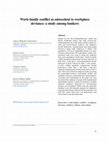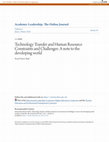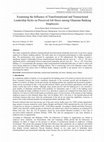Papers by Kwasi Dartey-Baah
Productivity Press eBooks, Jun 1, 2022
Academic Leadership: The Online Journal, 2010

African Journal of Management Research, Aug 18, 2022
Hinged on the Job Demand-Resource model and Source Attribution Theory, this study assessed the re... more Hinged on the Job Demand-Resource model and Source Attribution Theory, this study assessed the relationship between work-family conflict (family-towork and work-to-family conflicts) and workplace deviant behaviours (organizational and interpersonal deviance) among bank employees in Ghana. The quantitative two-wave longitudinal design was used, and data collected from 301 respondents. Unique selfgenerated codes were used to match the responses from each respondent in both times. Work-to-family conflict predicted interpersonal deviant behaviour in both Time 1 and Time 2, and organizational deviant behaviour in Time 2 but not in Time 1. Also, familyto-work conflict predicted interpersonal deviant behaviour in both Time 1 and Time 2 and also predicted organizational deviant behaviour in Time 1 only. This is one of the few empirical studies assessing the relationship between work-family conflict and workplace deviance, and in particular, among bankers. Assessing such relationships in this study over time has shown that variations in nature of the hypothesized relationships could be a result of extraneous variables (dynamic employee behaviour or environmental changes) not anticipated. Banks must pay particular attention to the job demands imposed on employees and again take interest in the out-of-job experiences of staff that could affect their job performance and involvement in deviant behaviours.
Productivity Press eBooks, Jun 1, 2022
River Publishers eBooks, Sep 1, 2022

Advances in intelligent systems and computing, Jun 2, 2019
The paper examines the relationship between emotional intelligence and job satisfaction levels of... more The paper examines the relationship between emotional intelligence and job satisfaction levels of employees in the Ghanaian banking sector and whether the relationship is moderated by the transformational and transactional leadership styles. It also examines the influence of some demographic variables (age and educational levels) on the relationship. A cross-sectional design was used with standardized questionnaires to collect data. Both the simple random sampling and purposive sampling techniques were adopted to select respondents. 208 bankers was engaged in the study. The results indicated a positive relationship between bankers’ emotional intelligence and their job satisfaction (β = .02, p = .38) although not statistically significant. However, transactional leadership (β = .18, p = .04) and transformational leadership (β = .17, p = .02) significantly moderated the relationship. The study shows the importance of leadership styles in facilitating job satisfaction among bankers and also reveals that age and high educational qualifications are not yardsticks for one’s level of emotional intelligence.
Routledge eBooks, Apr 10, 2023

Academic Leadership: The Online Journal
capable and sophisticated. Although countries like Brazil, China and India have made significants... more capable and sophisticated. Although countries like Brazil, China and India have made significantstrides, most African countries have fallen behind in this journey. The good thing is, with globalisationand free trade; certain technologies previously controlled by certain developed countries are findingtheir way into the developing world markets without the associated costs. For example, somemultinationals now invest in developing countries in order to obtain a base for export to other subregionsand by doing so make available aspects of their technologies. The opportunity developingcountries have is to create an environment which would attract multinationals to invest into theircountries without compromising the freedom of their people. This approach will enable developingcountries to gain insights into emerging technologies, while taking the opportunity to develop their owntechnologies. It is for this reason that the right human resource capabilities with the appropriate skillsare es...

Human Resource Management Journal, 2022
Although there is a consensus in the literature that layoff can be viewed as a form of psychologi... more Although there is a consensus in the literature that layoff can be viewed as a form of psychological contract (PC) violation, research is yet to examine how such violation impacts layoff victims' well‐being outcomes including life satisfaction, sleep quality and psychological distress. Integrating psychological contract theory and the conservation of resource theory, we hypothesized a dual‐stage moderated mediation model in which PC violation resulting from layoff is associated with three dimensions of layoff victims' well‐being via worry. This indirect effect is proposed to be conditional on the level of social support received. Based on a sample of 252 layoff victims, we found support for the dual‐stage moderated mediation model in which the association between PC violation and the three dimensions of well‐being via worry was weak for layoff victims reporting high levels of social support. Findings contribute to our understanding of how PC violation is associated with nonw...

Industrial and Commercial Training, 2021
Purpose The purpose of this paper is to investigate the influence of transformational and transac... more Purpose The purpose of this paper is to investigate the influence of transformational and transactional leadership styles on employees’ work engagement and the moderating effects of perceived organisational politics (POPS) in indigenous Ghanaian Banks. Design/methodology/approach The study uses a cross-sectional survey design and a quantitative approach to gather data from 430 respondents through the use of structured questionnaire. The covariance-based structural equation modelling was used to analyse the data with the aid of statistical package for social sciences and AMOS. Findings The analyses revealed that transformational leaders had a positive influence on employee engagement while transactional leadership did not have a significant influence on employee engagement. POPS also had no influence on employee engagement. Furthermore, POPS failed to moderate the relationship between leadership styles and employee engagement. Practical implications The findings of this study provide...

Industrial and Commercial Training
Purpose There is a major lacuna in sustainable human resource management (HRM) research regarding... more Purpose There is a major lacuna in sustainable human resource management (HRM) research regarding the theoretical context of its adoption or implementation. Consequently, the purpose of this study is to examine the relative influence and interactive effects of different levels of institutional isomorphisms on sustainable HRM adoption. Design/methodology/approach This study applies the conceptual method and anchors the discussions on the institutional theory and the extant literature on the antecedents of sustainable HRM implementation. Findings Internal and external institutional isomorphisms will have complementary (synergies) or substitution (trade-offs) effects on sustainable HRM adoption. Furthermore, external institutional isomorphic pressures related to societal values and culture and stakeholders’ sustainability demands are likely to have greater influence on sustainable HRM implementation relative to the internal institutional isomorphic pressures related to managerial susta...
The study examined the effect of leadership behaviors (transformational (TFL) and transactional (... more The study examined the effect of leadership behaviors (transformational (TFL) and transactional (TSL) on organizational citizenship behavior (OCB) while assessing the mediating role of job involvement. The investigation involved 209 employees from 45 different hospitality institutions (20 hotels, 10 guesthouses and 15 restaurants) in Accra, Ghana. Using multiple regression analysis, findings indicated that both leadership behaviors increase employees’ engagement in OCB in the Ghanaian hospitality industry. It further established that job involvement mediated between TSL behaviors and OCB. However, we did not find support for our argument that job involvement can mediate TFL and OCB. The implications of these results for theory and practice are discussed. JEL Classification: M12
Communicatio, Jul 3, 2019
CSR activities in Ghana are undoubtedly receiving spectacular approval, either through companies’... more CSR activities in Ghana are undoubtedly receiving spectacular approval, either through companies’ voluntary acts to improve social conditions of the communities in which they operate or purely as a...
International journal of business, 2017
The purpose of this study was to determine whether employees in Ghana's banking sector perceive t... more The purpose of this study was to determine whether employees in Ghana's banking sector perceive their leaders to be emotionally intelligent based on their style of leadership. The study was cross-sectional in nature and made use of structured questionnaires to collect quantitative data. Out of 300 questionnaires administered, 234 were returned (comprising of 115 males and 119 females). The findings of the study revealed that a positive relationship exists between transformational leadership and emotional intelligence (EI) whereas a negative relationship was found between transactional leadership and EI of leaders. The study also noted that transformational leaders are more emotionally intelligent; thus, it is recommended that EI an attribute associated with leader effectiveness be made part of leadership development in organizations.
International Journal of Marketing Studies, Mar 30, 2012

African Journal of Economic and Management Studies, Jun 10, 2019
Purpose Leaders are seen as representatives of their organisations; as such, their actions and be... more Purpose Leaders are seen as representatives of their organisations; as such, their actions and behaviours towards their subordinates reflect on the organisations. The purpose of this paper is to investigate the influence of some dimensions under transformational and transactional leadership styles on perceived organisational support (POS) in Ghana. Design/methodology/approach Data were collected from 264 engineers and technicians from the country’s power transmission subsector through a survey. Covariance-based structural equation modelling was used in analysing the data with the aid of Statistical Package for Social Sciences and AMOS. Findings The analysis indicated surprisingly that idealised influence predicted POS negatively while intellectual stimulation had no significant influence on employees’ POS. However, inspirational motivation, individualised consideration and contingent rewards predicted employees’ POS positively with contingent reward having the highest influence on POS. Practical implications The study’s findings indicate the importance that engineers and technicians in Ghana attach to support from their leaders, specifically inspiration and motivation, consideration for their needs and interests and rewards for their performance; thus, the study recommended that organisations must entreat their leaders to show such supportive behaviours towards their subordinates. Originality/value The study findings present fresh knowledge from a developing country perspective with regard to the importance that employees attach to these leadership dimensions.

International journal of business and management, Jul 24, 2015
This study examined the influence transformational and transactional leadership styles have on jo... more This study examined the influence transformational and transactional leadership styles have on job stress among employees in Ghana's banking industry. The study made use of structured questionnaires to collect quantitative data. 196 questionnaires were returned by respondents out of 250 administered. The findings revealed a significant negative relationship between transformational leadership and job stress (β =-.193, p< .05) and a significant positive relationship between transactional leadership and job stress (β = .165, p< .05). From these findings, it is recommended that managers adopt transformational leadership behaviours in order to reduce job stress among employees in Ghana's banking industry. This is a pioneering work in the Ghanaian context where participants have been drawn from 19 different banks; making it possible to get general views of employees concerning the subject.

International journal of tourism cities, Jul 10, 2023
Purpose This paper aims to focus on the nexus between sustainability and desired outcomes for sma... more Purpose This paper aims to focus on the nexus between sustainability and desired outcomes for smart cities. The main focus is on how green leadership influences the relationship between smart and sustainable activities and stakeholder management. Design/methodology/approach The work is essentially a non-empirical review of the literature to develop a conceptual model to be tested in a subsequent study. Findings The findings indicate that smart cities and their sustainability activities can drive desired outcomes through green leadership. Also, green leadership has an indirect relationship with the desired outcomes of smart cities; hence, managers in the tourism and hospitality industries should cultivate their green leadership style to assist smart cities in accomplishing their goals. Research limitations/implications This research is conceptual, and the proposed model will need to be evaluated to be more valid. Furthermore, the model is restricted to the tourist and hospitality industry, limiting the generalization and application of the findings to that area. Furthermore, because sustainability activities and smart city leadership differ by region or country, the proposed model will be suitable for more developed economies with more developed sustainability policies. Practical implications This paper makes a novel theoretical contribution by using stakeholder management as a mediating variable and green leadership as a moderating variable concurrently. Originality/value This model suggests that smart and sustainability activities of cities can lead to desired outcomes for smart cities through effective stakeholder management and green leadership.

Journal of Applied Research in Higher Education, Jul 1, 2019
PurposeThe purpose of this paper is to explore how lecturers in both public and private universit... more PurposeThe purpose of this paper is to explore how lecturers in both public and private universities in Ghana are motivated to take up teaching as a career using Herzberg’s two-factor theory.Design/methodology/approachIn this paper, qualitative research design was adopted. Data were collected from 24 lecturers from both public and private universities in Ghana and analysed with NVivo.FindingsResults from the analysis indicate that public sector university lecturers are generally better motivated than their counterparts at the private sector. Workload is higher at private universities, affecting research and publications negatively. The study also revealed that there are differences in motivation in relation to the hygiene factors between the public and private university teachers.Research limitations/implicationsThis study has a few limitations that must be considered and could provide guidance for future study; as this study addressed faculty point of view, future study could investigate from manager’s and other stakeholders’ point of view in order to get a holistic view of the issues under investigation. The sample size could be improved and the study could be conducted in other African countries for the purposes of comparison.Practical implicationsThe study shows that many lecturers are not happy in the job for both public and private universities. The findings of the study provide managers in the higher education industry with practical guidelines for strategies to motivate lecturers.Originality/valueDespite the rapid growth in the educational industry in Ghana, limited studies have been conducted into how lecturers are motivated to stay in teaching. This makes this research unique in Ghana. This study makes an original contribution by comparing how public sector and private sector university lecturers differ in their motivation to teach at the university using Herzberg’s two-factor theory.

African Journal of Economic and Management Studies, Sep 4, 2017
Purpose The purpose of this paper is to determine the extent to which leaders’ emotional intellig... more Purpose The purpose of this paper is to determine the extent to which leaders’ emotional intelligence (EI) predict the voluntary work behaviors (i.e. organizational citizenship behavior (OCB) and counterproductive workplace behavior (CWB)) of employees in the Ghanaian banking sector. Design/methodology/approach Quantitative approach was adopted to collect data from 234 respondents working in both high- and low-performing banks in Ghana. Both purposive and simple random sampling techniques were used for the selection of the respondents. Findings The findings of the study revealed that the leaders’ EI positively predicted the OCB of employees while a negative relationship was found between leaders’ EI and its prediction of employees’ CWB. Thus, emotionally intelligent leaders are able to evoke citizenship behaviors while mitigating CWBs of employees in the Ghanaian banking sector. Research limitations/implications The research addresses the gap in literature on how leaders’ EI influence employees’ tendency to exhibit either OCB or CWB specifically in the Ghanaian context. Practical implications The findings suggest that organizational leaders especially in the Ghanaian banking sector should be trained to be emotionally intelligent in their relationship with employees as such skills boost positive voluntary behaviors and have the tendency to alleviate the negative behaviors by employees. Originality/value The study provides an in-depth account on how the leaders’ EI influence both employees’ OCB and CWB and how to appropriately evoke or alleviate them, respectively.
Uploads
Papers by Kwasi Dartey-Baah